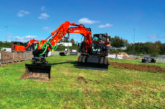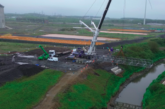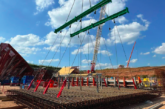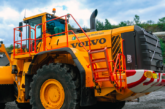
The UK’s construction equipment rental market is forecast to be worth over £4.7bn in 2019, exceeding its peak value reached in 2007. Growth in this market has been continuous since 2011, at a level of 3-4% per year.
The primary driver for growth is the performance of particular end-use sectors, with hire of planers, pavers and rollers depending on the level of highway repair activity, and forklift hire on the level of distribution & warehouse activity, while the weather can have an impact on the level of hire of pumping and climate control equipment, for example.
Although growth has tended to remain steady, the market performed particularly strongly in 2014 when it increased by around 8%, driven by a higher demand in housebuilding, among other factors. Overall infrastructure remains the key end-use sector, although certain parts of the infrastructure sector have performed differently in recent years; the rail sector, for example, has been declining in recent years, whilst the utilities sector – in particular electricity – has performed well.
Other key end-use sectors include housebuilding, offices, education and industrial, while major non-construction sectors include manufacturing, waste management and events. In terms of equipment categories, earth moving equipment represents the largest sector, accounting for around 22% of equipment hire value.
Other key sectors include lifting, access equipment, skips & rubbish chutes, portable buildings & environmental control and hand & power tools. The construction equipment rental market is highly competitive, which can impact hire rates. The upturn in demand in 2013 and 2014 in particular saw some hirers start to increase rates, however, the trading conditions in 2015/16 have seen prices become more stable.
The market is relatively fragmented, reflecting the high number of specialist operators with different competitors in different hire product sectors, though this fragmentation is set to reduce going forward, with acquisition activity increasing. The level of hire is also dependent on companies opting to hire rather than buy.
Many companies choose to hire plant and tools, generally to avoid risks such as capital investment risks, operating risks and legislative/compliance risks, but hiring construction equipment also provides other benefits, such as use of the latest machinery, which can lead to improved productivity levels and higher standards.
Additionally, machinery repair and maintenance costs are borne by the hire company and not the owner/contractor. Trends within the construction industry are likely to impact on different sectors of the hire market. One trend likely to benefit the market is the expected switch back in favour of flats rather than houses, which is likely to benefit some hire sectors such as some primary construction equipment needed for the construction of multi-story apartments.
However, the underlying long-term growth in off-site manufacturing (OSM) will tend to erode on-site hire requirements. Additional hire demand will be achieved from non-construction sectors such as manufacturing, events and recycling/waste management.
“From 2018 onwards, construction sub-sectors forecast to increase output include infrastructure, entertainment & leisure, industrial and health, as well as housebuilding, while sectors such as education, offices and retail are not forecast to experience growth in the short term” said Keith Taylor, Director of AMA Research. “The biggest risk factor in the forecast will be the effect of the ‘Brexit’ negotiations on the levels of business confidence and investment, which in turn will impact on the construction industry.”
The ‘Construction Equipment Rental Market Report – UK 2017-2021 Analysis’ report is published by AMA Research, a leading provider of market research and consultancy services with over 25 years’ experience in the construction and home improvement markets.
The report is available now and can be ordered online at www.amaresearch.co.uk








